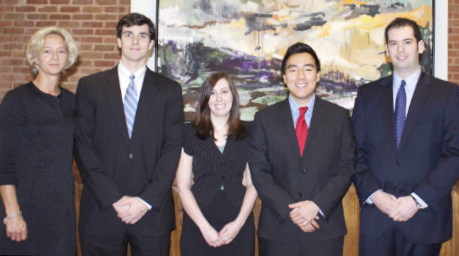Kaufman & Canoles Awards Recognize First-Year Students for Legal Writing
The law firm of Kaufman & Canoles recognized three members of the first-year class for outstanding legal writing at a luncheon at the Law School on April 20. Kaufman & Canoles 2012 Writing Awards were given to Nathan Yu '14 for first place, to Lianna M. Bash '14 for second place, and to George B. Flemming '14 for third place.
During spring semester, all first-year students submitted a final client memo as part of the Legal Skills Program. Program faculty recommended the best memos submitted by their students for recognition; from these 14 finalists, Helena Mock, the program's writing specialist, chose the three award recipients.
In remarks at the luncheon, Professor Fredric Lederer, director of the Center for Legal and Court Technology and the Legal Skills Program, thanked the firm for its generosity in helping the Law School "celebrate the legal research and writing accomplishments in effect of our entire student body by having made this set of awards possible. Legal research and writing are obviously the fundamental and critical component of the Legal Skills Program."
Alison V. Lennarz, Of Counsel at Kaufman & Canoles, said that the firm's lawyers greatly valued their "partnership and affiliation" with the Law School. She noted that many of her colleagues were William & Mary graduates, or have taught as adjunct professors in the Legal Skills Program, or have participated, as she has, in Law School events such as the Supreme Court Preview.
Having taught in the program herself, she said, she had a keen appreciation for what the student award winners had accomplished. While the program provided ample tools to teach them how to write like lawyers, it was up to them "to internalize [what they were being taught], to rewrite and edit and look objectively [at their own writing]." She congratulated the winners and told them that excellent writing skills would serve them well in their legal careers.
Michael Heikes, J.D. '84, an adjunct professor in the Legal Skills Program and an attorney at Heikes & Bolinger in Williamsburg, congratulated Yu, a student in his Legal Skills law firm, and Bash and Flemming on their awards. "The ability to express yourself in writing," he said, "is probably the premier skill any attorney can have. You will use it in a host of different contexts, not only in brief writing or persuasive writing for a court but also in your ordinary correspondence with other attorneys and to clients. There is a host of outlets for writing, and when it is done well it speaks very highly about you."
